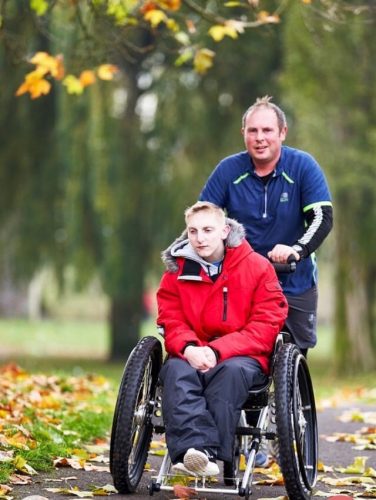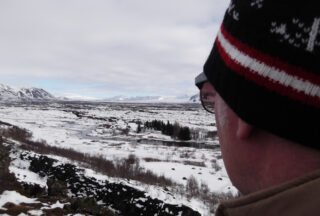Rudyard Kipling wrote a few poems in his time and I will use one to introduce my story. I am Maj Edd Gordon and I have served 28 years in the Army. For 20 of those I have also been a care provider. It is like admitting you are addicted: you don’t see you are doing anything other than being a dad, but… I am, and my wife is more than a mum and my daughter is more than a sister.
Rudyard Kipling wrote: “I keep six honest serving-men, (They taught me all I knew); Their names are What and Why and When. And How and Where and Who.
What: Harry is a complex young man. He was born in Germany and is the ONLY child in the world with his complex chromosomal condition. It’s science that he is different from “normal” but it’s not science that he needs more help in the world: he uses a wheelchair, he has seizures, he is small and easily knocked over by bigger kids, he has no mental capacity to understand the world and he loves heavy metal and banging toy cars.
Why: This is an ethereal question and can never be answered. You can spend time pondering, worrying or beating yourself up about this, but it’ll only make you sad. And that won’t help anyone.
When: Harry was born in 2000 and my family’s world changed that day. Things I never worried about or concerned my thinking took over and framed our future. Can a wheelchair get around that park? Will Harry be able to wait long enough for the food to be delivered? How far away are we from the nearest hospital?
When is EVERY DAY
How: How has this happened doesn’t matter. How has this impacted our lives is significant. As a service family life is odd anyway. We are remote from our wider family. We move to a new house and job every two or three years and we deploy all over the world, expecting our families to just get on with life and be there when we get back.
Who: Harry is the centre of this story but the impact ripples through the family.
To put into context what it is like to be a serving military care provider a few stories of things that have happened in our time may add some colour.
As a Services person it comes with the territory to be deployable and mobile. Consideration is given to additional needs and compassionate matters in the Army – very good consideration, but you must play your part. As such, I have deployed on 11 Operations in 28 years, seven whilst Harry has been part of our family.
On deployment to Kosovo in 2001 Harry was unwell. He had cellulites and was being barrier nursed in a German hospital one hour from our home. My wife lived in a flat at the hospital and I deployed on a later flight, but I still deployed. Leaving my wife in that flat, with no one who spoke English and near our son while our daughter (who is older than Harry) stayed with our good next door neighbours. The military family is a community and those early friends made life possible for all of us.
Another example of the impact of deployment on a family with a unique child is the Iraq conflict in 2003. I deployed with the Black Watch and in the build-up phase in the Saudi Desert I received news that Harry needed a routine operation to remove his tonsils. No big issue in our world. The preoperative blood tests however had highlighted that Harry had a high likelihood of leukaemia. This was the 18th March 2003, the air campaign started that night. The ground war in which I fought started on the 19th March and I did not speak to my family until 19 days later when I used the mobile phone of a Times reporter to call my family and see what had happened. The operation had not happened for fear of further bleeding and more testing was being conducted. The ground war did not finish for a further seven days and I managed to use a welfare sat phone after a month. Harry was well and the issue was not leukaemia but another clotting disorder. Still an issue, but just another one on Harry’s list.
Those are examples, but every day something small happens: a pharmacist changes a prescription to save money but doesn’t consult the Dr or family and a drug is issued that he is allergic to.
A wheelchair is locked on a mini bus all weekend and no one has the keys to get it back. A social worker changes a transport plan or fails to book at all and Harry ends up stranded at a care centre. The list is endless.
The impact of being a military family with a child with special needs has horrendous stresses, but it also has huge highs. The isolation of military life creates the conditions where family isn’t those you are related to. We have had fantastic friends help us throughout this time and still do, but the journey isn’t over.
The fact I have gone from Private to Major (selected for Lieutenant Colonel) over a 28 year career (so far) is not because the Army can’t cope with my family, or that service life is not compatible. It just needs a team approach and to be flexible. Both ways. Harry always beats me by half a second on Park Run and we do things you would expect. We just do them our way.





